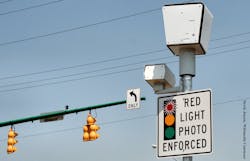A study by the Insurance Institute for Highway Safety (IIHS) reviewing the use of red-light cameras at four major intersections within the county of Arlington, VA, over a two-year period determined that those cameras significantly reduced the number of red-light violations – proving, in the eyes of the group’s researchers, that such technology can successfully “modify” driver behavior.
Anne McCartt, senior vice president for research at IIHS and the study’s lead author, said that one year after the start of ticketing in July 2010, the odds of a red light running violation at those four camera-covered intersections dropped across the board.
She said violations occurring at least 0.5 seconds after the light turned red were 39% less likely than would have been expected without cameras, with violations occurring at least 1 second after were 48% less likely, while the odds of a violation occurring at least 1.5 seconds into the red phase fell 86%.
“The study provides fresh evidence that automated enforcement can get drivers to modify their behavior,” McCartt noted. “What these numbers show is that those violations most likely to lead to a crash are reduced the most. The longer the light has been red when a violator enters an intersection, the more likely the driver is to encounter a vehicle traveling in another direction or a pedestrian.”
To calculate how the cameras affected violation rates, IIHS researchers videotaped traffic a month after ticketing began and again after a year.
In addition to the four camera-enforced intersections, videotaping was done at four other intersections in Arlington — two on the same corridors where cameras were located and two elsewhere — to see if there was any spillover effect from the cameras, while four control intersections in neighboring Fairfax County, which does not have a camera program, also were observed.
“The Arlington program is another example of the safety benefits cameras bring to intersections,” said David Kelly, executive director of the National Coalition for Safer Roads (NCSR) and former acting administrator for the National Highway Traffic Safety Administration (NHTSA), told Fleet Owner.
“Red-light runners don’t discriminate who they hit,” he explained. “Commercial drivers are at as much risk as everyone else on the roads. We have to make sure that we are doing everything we can to get drivers to slow down at intersections and obey the light.”
Kelly pointed out that, due to their size, it is harder for commercial vehicles to stop short or perform evasive maneuvers to avoid a crash. “This makes them particularly susceptible during intersection crashes,” he stressed, why is why red-light cameras can benefit carrier safety.
IIHS added that the number of U.S. communities currently using red-light cameras have grown to about 540, with a 2011 study by the group of large cities with longstanding red-light cameras finding that cameras reduced the fatal red-light running crash rate by 24% and the rate of all types of fatal crashes at signalized intersections by 17%.
About the Author
Sean Kilcarr
Editor in Chief
Sean Kilcarr is a former longtime FleetOwner senior editor who wrote for the publication from 2000 to 2018. He served as editor-in-chief from 2017 to 2018.
